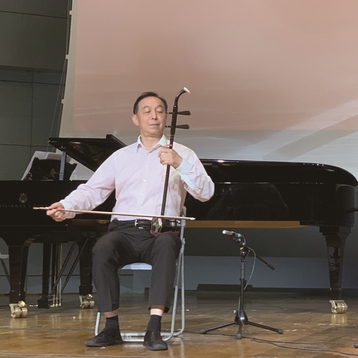Qi Jianda

Qi Jianda, male, born in 1954. Jiangsu Nanjing native, Han nationality, erhu performer, educator, national first-class actor. Graduated from the Music Department of Capital Normal University. He used to be a solo performer of the Air Force Art Troupe, and is now the deputy head of the Nanjing Xiaohonghua Art Troupe, a member of the Chinese Musicians Association, a director of the Erhu Society of the Chinese Musicians Association, a director of the Huqin Professional Committee of the Chinese National Orchestra Society, and a judge for the senior professional title of Jiangsu Province.
He has created folk music works such as Erhu Solo "Shaking Dewdrops", "Riding in Water Village", "Song of Mountain Village", folk music ensemble "Colorful Melody", etc. These works have been selected in national and provincial folk music competitions and art festival competitions. Award-winning, incorporated into the "Erhu Music Collection" and "National Erhu Performance Test Work Collection" published by Shanghai Music Publishing House and People's Music Publishing House. Many students of the professor won the highest level award in major national competitions, and most of them were admitted to the central government. He studied at the Conservatory of Music, China Conservatory of Music, Shanghai Conservatory of Music, Tianjin Conservatory of Music, Nanjing Academy of Arts, and Nanjing Normal University Conservatory of Music. Many papers have been published in national and provincial core journals. In 1994, in the province's first erhu grading test, three students won the highest level of excellence; from 1995 to 2003, more than 30 students won the sixth, seventh, eighth, ninth and tenth grades of excellence, and participated in the provincial excellent candidates concerts over the years. Got unanimous praise. In 2000, he was awarded the title of Outstanding Instructor by the Jiangsu Musicians Association in the first batch. He has successfully held erhu demonstration teaching concerts titled "Resonance of Vibration of Strings" - Erhu Rhapsody and "Erquan Reflecting the Moon" in Nanjing, Jiangyin and other places for many times, and the response was enthusiastic. The erhu mute instrument developed in cooperation with others won the national patent, and the CD "Spring in the North" was recorded. He has visited the United States, France, Japan, Singapore, South Korea, Hong Kong, Taiwan, Macao and other countries and regions. His art biography was included in "Who's Who in the World".
Similar artist
Involving musical instruments
Involved portfolio
Involved news
Popular artists
- 01 Zhang Xiuyan
- 02 Chen Tao
- 03 Li Muliang
- 04 Zhu Changyao
- 05 Zhang Gaoxiang
 渝公网安备 50010702504639号
渝公网安备 50010702504639号